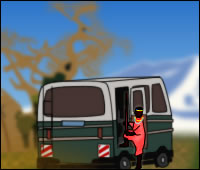Time Out in Africa: Part 5
Created | Updated Feb 26, 2004

This trip stems from a promise that El (my better half) and I had made to ourselves - when her exams were over we would take off for a while, travel the world, have a little fun. The aim was to do a wide variety of stuff – some touristy things, some mountains, see some friends and family. Most of this journal dates from notes I took in the evening - I have allowed hindsight to creep in in some places though...
Day 14+15 - Arusha - Not A'rush'in around
First striking thing about Arusha is the incredible quantity of people walking somewhere. There is public transport (the dreaded Dalla-Dalla - more later) quite a few bicycles and enough vehicles to create the usual developing country air pollution. As we reach the clocktower, the central point of tourist Arusha, a range of touts and street vendors converge on us - newspaper and batik sellers seem to be the bottom of the scale with touts for curio shops and safaris also very frequent. As usual, unfortunately, there's a lack of diversity and originality in what is being proposed in the way of souvenirs. The same motifs, statues patterns are found over and over again, with the result being that twenty boutiques fight for the same tourists and the prices are forced to rock bottom. One exception to this standardisation is the optimistic chap who tries to sell us potatoes from a sack. Nice try but no thanks.
We meet a local lad who confirms that tourism is more or less the only decent form of employment available in Arusha apart from small scale/subsidence farming. There seems to be a chronic underemployment problem, with scores of young lads wandering around looking for something to do. Very little begging though - only the seriously disabled. Few young children on the street either - most of the touts are at least 15, with school in the urban areas apparently well attended.
One amusing scene in the curio market - of the 20 boutiques, El buys something from two stalls at either end that have the same owner - he pops up like Mr Ben after having run from one end of the market to the other. El goes back to the first stall to change the colours on her blanket and boing! Up he pops again.
Although the street vendors are all African, many of the shop owners are East African Asians - Urdu speakers, still clearly retaining an important place in society.
Day 16 + 17 Ilk'itinga and preparation for Kili – culture in the coffee bushes
Booked on our second cultural tourism programme, becoming more cultured than a natural yoghurt, we head up into the foothills of Mt Meru where we meet Frederick, our guide for the day. He is a law student earning a bit of cash on his holidays. We discuss the intricacies of contract and criminal law as we stroll through field systems - quite surreal to be racking my brain on aspects of the law on provocation in this damp and green environment. Cabbage, 'Irish' (as opposed to sweet) potatoes, onions and coffee all seem to be doing well.
Fred takes us to meet a Masai knife maker. Intriguingly, he buys kitchen knife style machetes in from China and then adapts them to the traditional Masai style. Asked what they did before he could get Chinese goods, he said they used tins. And before that? He didn't know - trade with somebody, clearly. He operates an old for new policy with the Masai - the warriors want a nice new knife that can cut through tough meat - he then sells their old knives to the tourists who want something with a bit of character and patina...
On the way downhill we talk politics, the impact of the USA in the world, terrorism. Fred predicts trouble for Bush at the next election. Certainly, he wouldn't win many votes in Tanzania.
The next day we meet the managing Director of the agency that is running our Kilimanjaro trek. We count out the dollars on a bench as he bemoans the fact that 75% of what we are paying goes directly to the government. Naively, I ask whether this will contribute to the conservation of the region - 'Conservation of the government's fat stomachs' he opines, while rubbing his own ample belly. He accepts that we pay some of the money at the gate, but says that he would not have done had we been Italian. As we express curiosity, he tells us about some corrupt Italian clients he's had in the past - including one who, when the employee spotted that a banknote was fake, offered to give him some real dollars to keep quiet about it.
